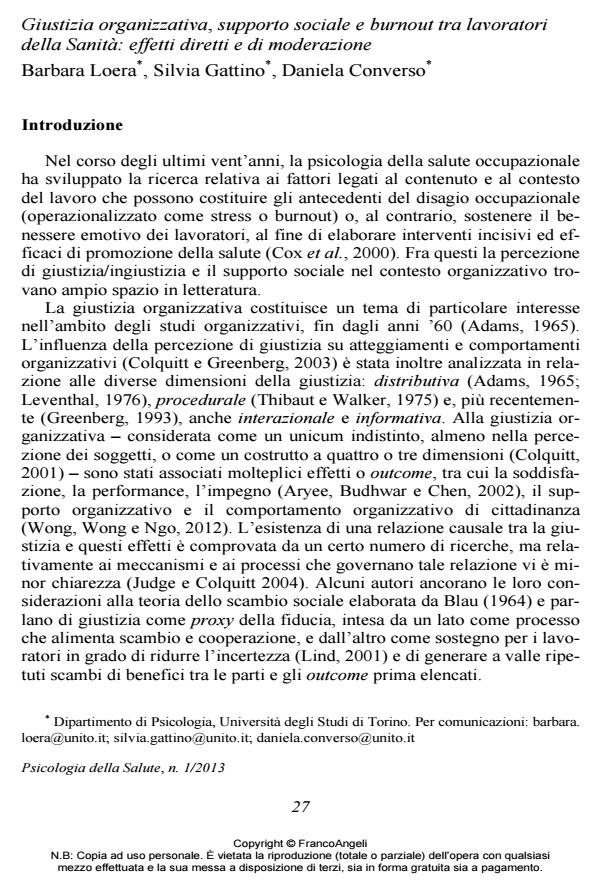Giustizia organizzativa, supporto sociale e burnout tra lavoratori della Sanità: effetti diretti e di moderazione
Titolo Rivista PSICOLOGIA DELLA SALUTE
Autori/Curatori Barbara Loera, Silvia Gattino, Daniela Converso
Anno di pubblicazione 2013 Fascicolo 2013/1
Lingua Italiano Numero pagine 22 P. 27-48 Dimensione file 322 KB
DOI 10.3280/PDS2013-001002
Il DOI è il codice a barre della proprietà intellettuale: per saperne di più
clicca qui
Qui sotto puoi vedere in anteprima la prima pagina di questo articolo.
Se questo articolo ti interessa, lo puoi acquistare (e scaricare in formato pdf) seguendo le facili indicazioni per acquistare il download credit. Acquista Download Credits per scaricare questo Articolo in formato PDF

FrancoAngeli è membro della Publishers International Linking Association, Inc (PILA), associazione indipendente e non profit per facilitare (attraverso i servizi tecnologici implementati da CrossRef.org) l’accesso degli studiosi ai contenuti digitali nelle pubblicazioni professionali e scientifiche.
Il contributo illustra i risultati di una ricerca sul ruolo che la giustizia organizzativa e il supporto sociale - da parte di colleghi e superiori - hanno in ambito lavorativo sull’insorgere del burnout. Obiettivo è evidenziare gli effetti di queste dimensioni organizzative sull’insorgere della sindrome e, nel dettaglio, identificare gli eventuali effetti di moderazione del supporto sociale sulla relazione tra giustizia organizzativa e burnout. Lo studio è stato condotto nell’Azienda Sanitaria Ospedaliera più grande del Piemonte e ha coinvolto 503 operatori che lavorano in tre reparti molto diversi dal punto di vista delle caratteristiche dei pazienti e dell’intensità del sistema di cure (ICU e non-ICU): medicina d’urgenza, medicina interna e radiodiagnostica. I risultati hanno messo in luce sia la presenza di effetti diretti della giustizia e del supporto sociale sul burnout, sia effetti di moderazione del supporto sociale sulla relazione tra giustizia e dimensioni del burnout, diversificati sulla base dei reparti coinvolti nell’indagine. .
Parole chiave:Burnout, giustizia organizzativa, supporto sociale, unità di terapia intensiva (ICU), unità di terapia non intensiva (non-ICU)
- Il benessere nei vigili del fuoco volontari: la mindfulness come risorsa psicologica Piergiorgio Argentero, Ilaria Setti, in PSICOLOGIA DELLA SALUTE 2/2015 pp.101
DOI: 10.3280/PDS2015-002006 - The relationship between menopausal symptoms and burnout. A cross-sectional study among nurses Daniela Converso, Sara Viotti, Ilaria Sottimano, Barbara Loera, Giorgia Molinengo, Gloria Guidetti, in BMC Women's Health 148/2019
DOI: 10.1186/s12905-019-0847-6 - The Interplay between Job Control, SOC Strategies, and Age in Sustaining Work Ability in a Sample of Administrative Employees Ilaria Sottimano, Gloria Guidetti, Sara Viotti, Daniela Converso, in Sustainability /2019 pp.1463
DOI: 10.3390/su11051463 - Evaluating the Psychometric Properties of the Maslach Burnout Inventory-Human Services Survey (MBI-HSS) among Italian Nurses: How Many Factors Must a Researcher Consider? Barbara Loera, Daniela Converso, Sara Viotti, Stefano Federici, in PLoS ONE /2014 pp.e114987
DOI: 10.1371/journal.pone.0114987 - Aging and Work Ability: The Moderating Role of Job and Personal Resources Daniela Converso, Ilaria Sottimano, Gloria Guidetti, Barbara Loera, Michela Cortini, Sara Viotti, in Frontiers in Psychology 2262/2018
DOI: 10.3389/fpsyg.2017.02262
Barbara Loera, Silvia Gattino, Daniela Converso, Giustizia organizzativa, supporto sociale e burnout tra lavoratori della Sanità: effetti diretti e di moderazione in "PSICOLOGIA DELLA SALUTE" 1/2013, pp 27-48, DOI: 10.3280/PDS2013-001002